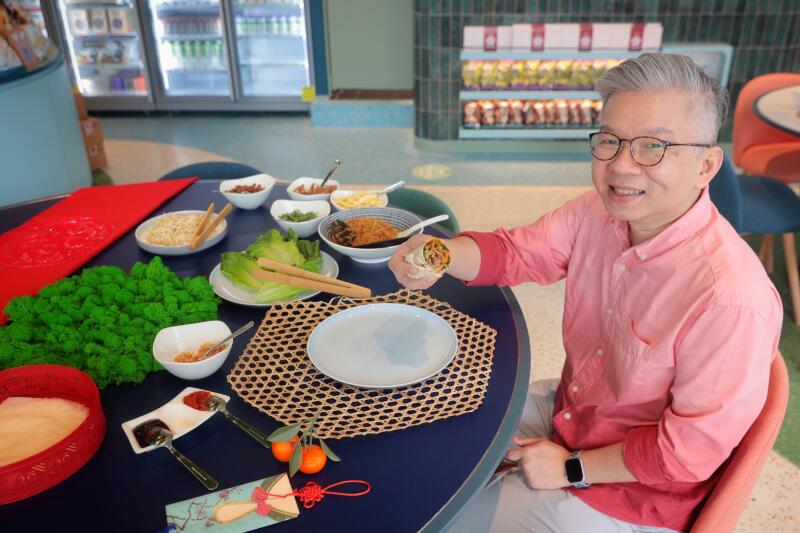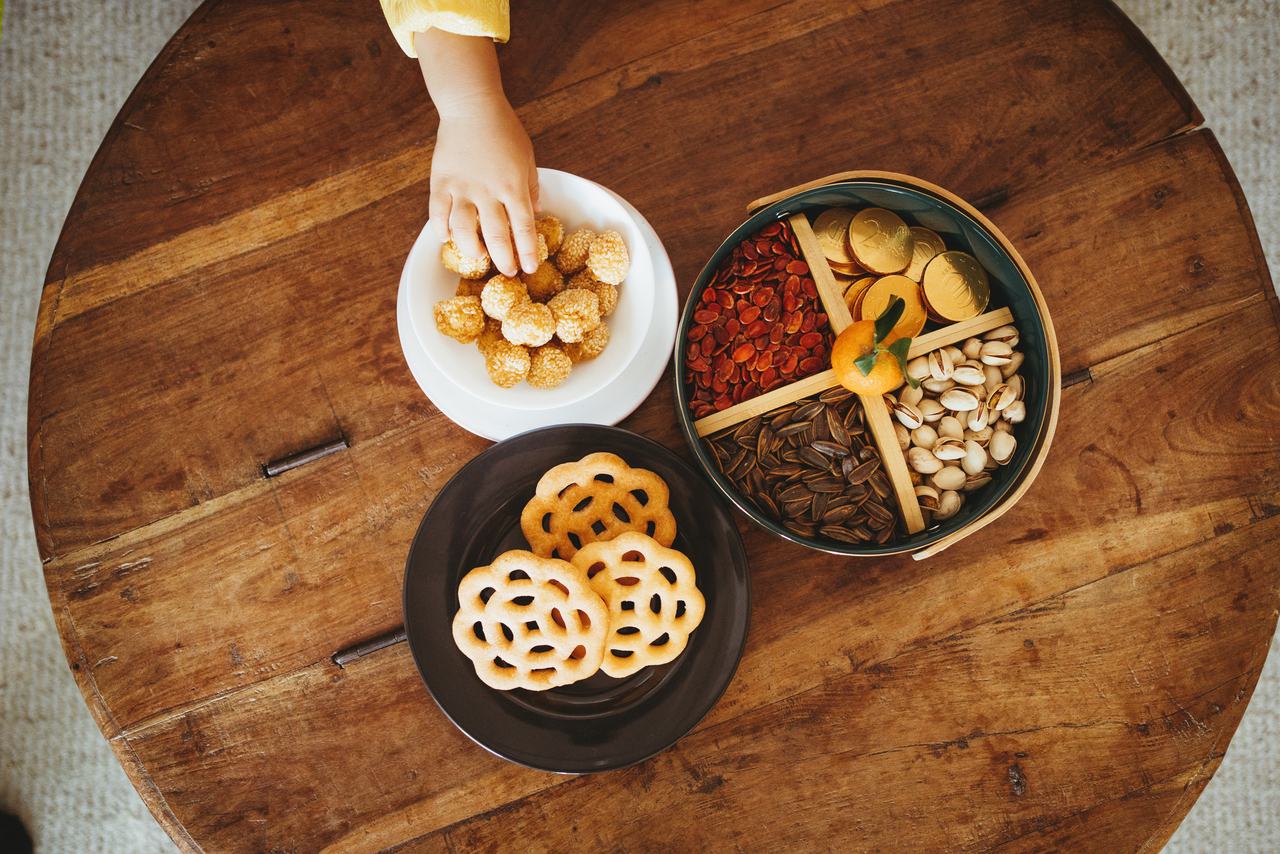Playing it safe this CNY: No steamboat, no lohei, more hygienic practices
Sign up now: Get ST's newsletters delivered to your inbox

Mr Kelvin Ng's reunion meal will feature a do-it-yourself vegan popiah spread in place of a steamboat.
ST PHOTO: JASON QUAH
SINGAPORE - Reunion meals for some families will take on a different form and taste this year.
Some are doing without lohei for fear of spreading droplets during auspicious cheers, while others are doing away with steamboat to avoid accidental cross contamination. One family is not even having meat.
For the first time, there will be no steamboat and meat dishes at Mr Kelvin Ng's reunion dinner at home.
The 48-year-old grew up in Malaysia eating exotic wild animal meat, such as flying fox, snake and wild boar, during family gatherings.
But the emergence of animal-derived infectious diseases in recent times such as Covid-19 and Sars has made him rethink his food choices.
The business development director (Asean) at Green Monday Group, a plant-based lifestyle platform, became a flexitarian in June last year. A flexitarian's diet is centred on plant-based foods and vegetables, with a reduction in meat and dairy foods.
Mr Ng's reunion meal with his wife, 14-year-old son and mother will feature a do-it-yourself vegan popiah spread in place of a steamboat.
They will roll their own popiah using ingredients such as Beyond Beef, OmniMeat strips that tastes similar to chicken, JUST plant-based egg, sweet turnip, crushed rice crackers, bean sprouts, chilli and black sesame soy sauce.
Mr Ng says: "We will maintain the communal style of dining because everybody still sits around the table and takes the food using serving spoons for each ingredient and sauce. It's just like we do for a steamboat, except this is a healthier meal."
The family will still be doing lohei but it will be a vegan one prepared by Mr Ng. He is using ingredients such as carrot, cucumber, turnip, crackers and OmniMeat strips, which he says make for a "tasty replacement" for the raw fish typically used in a yusheng dish.
Ms Jennifer Shim, a dietitian at Parkway East Hospital, notes that a vegan diet or meal has generally low or negligible cholesterol content. Healthy cholesterol levels are associated with a lower risk of heart disease.
Going vegan, Ms Shim adds, also encourages one to eat more fruits and vegetables, increasing the intake of fibre, antioxidants and a variety of vitamins and minerals.
For retired teacher Neo Puay Hwa and her family, they are playing it safe by not having both lohei and steamboat.
"In previous years, there will usually be at least 20 family members squeezing around the table to lohei, which is the fun part. But with the restrictions on the number of visitors this year, it won't be as fun and memorable," the 63-year-old says.
Only eight visitors a day are allowed in a household and people are encouraged to limit visiting to at most two other households a day.
Instead of steamboat, Ms Neo's family will cook and place a big pot of pork bone and seafood soup in the kitchen, from which they can scoop their own portion with a serving spoon.
"We don't like the idea of having uncooked food around and not having our masks on when we speak," she says.
Dr Raymond Fong, chief and senior consultant at Changi General Hospital's Department of Infectious Diseases, says that while it is a common Asian practice for people to share food using their own cutlery, it is highly discouraged.
"Double dipping of sauces is also not a hygienic practice, and individual sauce portions should be provided for each guest," he adds.
While serving cutlery should be used, he warns that they can also be contaminated by dirty hands which may carry viruses.
"Hence, one should not touch one's mouth, nose and eyes when using the serving spoons and chopsticks - unless they have sanitised their hands," he says.
Agreeing, Associate Professor Sophia Archuleta, head and senior consultant at National University Hospital's Division of Infectious Diseases, advises people against having buffets.
"Buffets tend to increase the contact between diners' hands and common surfaces as people share serving ware. It is best to serve individual portions and practise hand hygiene," she says.
Those who are going ahead with their steamboat and lohei plans should wash their hands thoroughly before handling food, Ms Shim says.
"Use separate utensils for raw and cooked food, ensure that food is cooked thoroughly by cooking them in batches and use a serving spoon when scooping food from the steamboat pot," she adds.
For auspicious cheers during lohei, Prof Archuleta advises using the DJ Beng lohei Web-based app. The free app allows users to tap their phone screens to play pre-recorded auspicious phrases.
"Singing, yelling and speaking loudly can spark a Covid-19 cluster in the community - like what happend during last year's Chinese New Year celebration at Safra Jurong," she cautioned.
That celebration, held in the ballroom of Joy Garden restaurant on Feb 15 last tear, accounted for 47 cases in Singapore.
Mr Raymond Seah will be using the app when he tosses yusheng at home with his family.
The 56-year-old retail assistant says his family initially did not want to have lohei due to fears of contamination, but decided to go ahead after finding out about the app.
Mr Seah says: "Lohei is a festive ritual that is said to bring prosperity for the new year ahead. I think that if we use the app, portion the food out using clean serving spoons and stick to the eight-visitor limit, it is still possible to have an enjoyable Chinese New Year."
How not to overeat during Chinese New Year
Ms Jennifer Shim, a dietitian at Parkway East Hospital, offers six tips on how you can maintain a healthy diet during the festive period.
1. Do not go visiting on an empty stomach
You are more likely to overeat on an empty stomach. Thus, ensure that you have your proper meals or take a high-fibre snack such as oats, nuts or fruits before heading out.
This will help you to avoid over-eating when you come across high-calorie treats such as pineapple tarts, bak kwa, or prawn rolls.
2. Choose your drinks wisely
Another way to control your calorie and sugar intake is to choose or ask for beverages that have the Healthier Choice symbol. They are lower in sugar.
You can also ask for non-sweetened beverages. These include buckwheat tea, roasted barley tea, green tea, Chinese tea, lemon or mint water, herb-infused water or plain water.
3. Enjoy a treat but set a limit

akcny10
PHOTO: ISTOCKPHOTO
Chinese New Year goodies can be irresistible and you can easily overeat them if you are not careful.
You can still indulge in some of the goodies by setting some limits. For example, you can set a limit on how many pineapple tarts you intend to eat in a day or try a bite-size bak kwa instead of a large piece.
4. Choose fresh food over processed food
Instead of high-calorie bak kwa, you can choose fresh and healthier alternative snacks such as mandarin oranges or nuts.
If you are cooking, use fresh ingredients such as lean meat or skinless poultry instead of processed food items such as fishballs and sausages. The fresh items are generally lower in salt and fat.
5. Slow down and mind your portions
To prevent others from topping up your plate, take your time with your food and make sure that there is always food on your plate.
Slowing down while eating can help you to avoid overeating as well. Remember that it takes up to 20 minutes after eating to feel full.
You may also want to use a smaller plate to help you to eat less.
6. Exercise while you visit
Burn some calories while going for a home visit.
When appropriate, walk to your next destination. Taking the stairs instead of the lift is also a good way to increase your physical activity levels.


